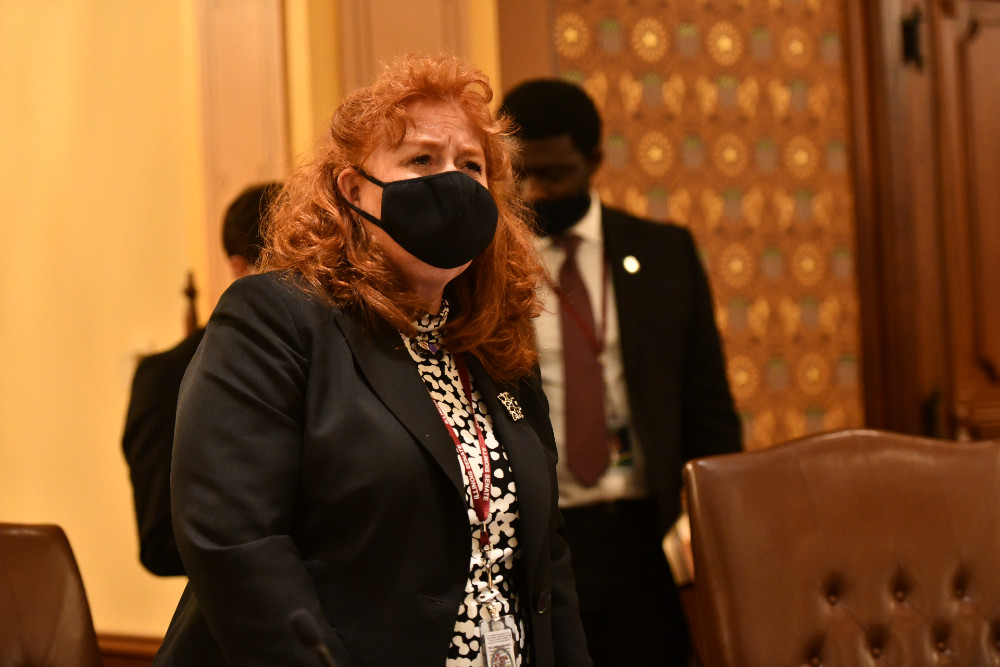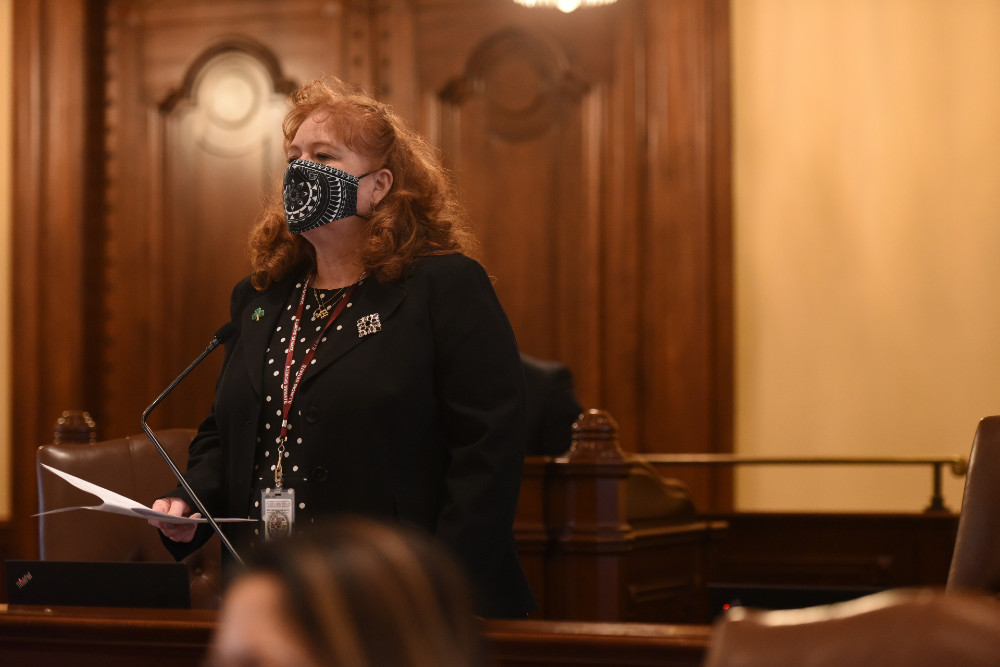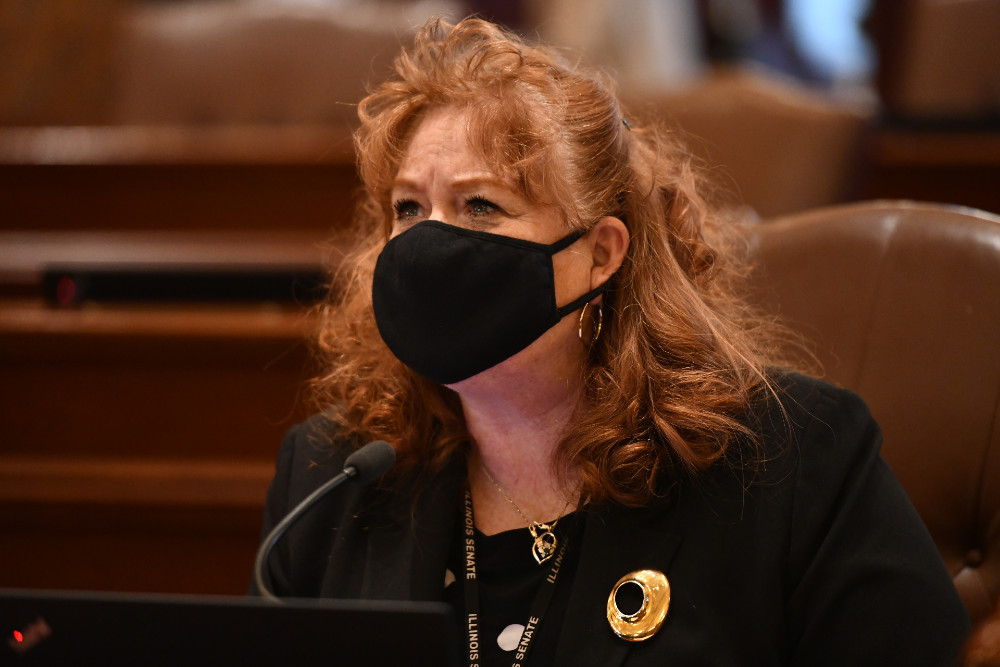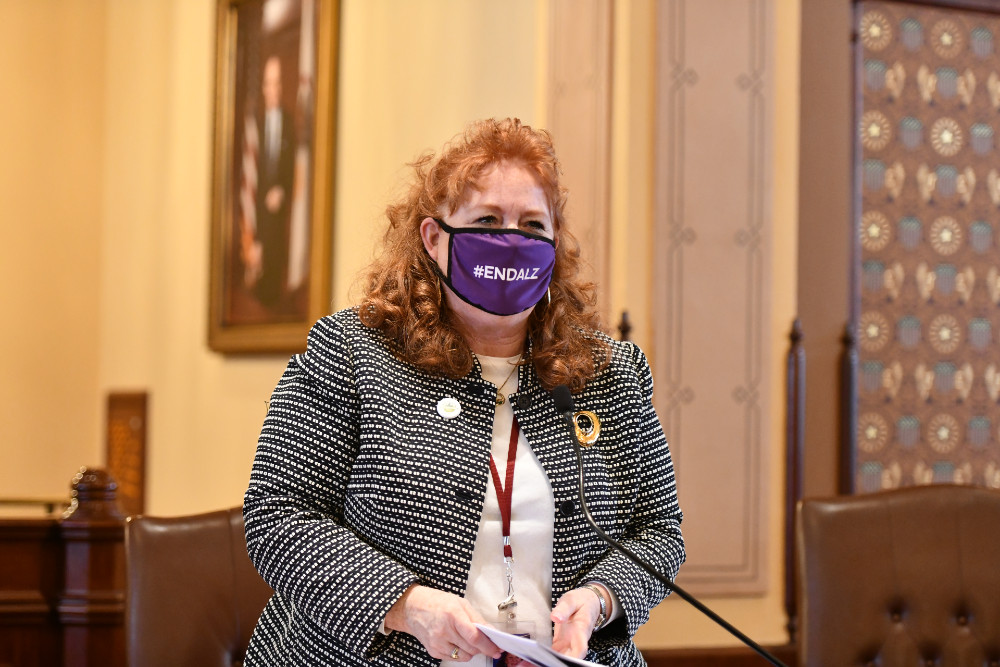- Details
 SPRINGFIELD – To reduce property tax burdens for more Illinois homeowners, State Senator Laura Murphy (D-Des Plaines) advanced a measure out of the Senate Wednesday to raise the maximum income limitations for the Senior Citizens Real Estate Tax Deferral and the Senior Citizens Assessment Freeze Homestead Exemption.
SPRINGFIELD – To reduce property tax burdens for more Illinois homeowners, State Senator Laura Murphy (D-Des Plaines) advanced a measure out of the Senate Wednesday to raise the maximum income limitations for the Senior Citizens Real Estate Tax Deferral and the Senior Citizens Assessment Freeze Homestead Exemption.
“The past year was particularly hard on older Illinoisans, and as a result, many are struggling to make ends meet,” Murphy said. “Expanding eligibility for the Senior Citizens Real Estate Tax Deferral and the Senior Citizens Assessment Freeze Homestead Exemption can help lift some of that burden.”
Starting this year, Murphy’s measure would raise the maximum income limitation for the Senior Citizens Assessment Freeze Homestead Exemption from $65,000 to $75,000 for Illinoisans 65 and older living outside Cook County. Starting next year, the new, higher limit would apply statewide.
The legislation would also raise the income limit for the Senior Citizens Real Estate Tax Deferral Act, bringing it in line with the homestead exemption to simplify the process for low- and moderate-income older residents seeking relief.
“Homeowners shouldn’t have to wade through complicated income tables and eligibility requirements to find out if they qualify for relief. This legislation brings the Senior Citizens Real Estate Tax Deferral and the Senior Citizens Assessment Freeze Homestead Exemption in line with each other to simplify the process,” Murphy said.
Senate Bill 2244 passed the Senate and now heads to the House.
- Details
 SPRINGFIELD – As college-bound seniors receive their acceptance letters and prepare for the fall semester, State Senator Laura Murphy (D-Des Plaines) is seeking to create a task force dedicated to making textbooks and other course materials more affordable.
SPRINGFIELD – As college-bound seniors receive their acceptance letters and prepare for the fall semester, State Senator Laura Murphy (D-Des Plaines) is seeking to create a task force dedicated to making textbooks and other course materials more affordable.
“After a year of remote learning and working, we have all become more familiar with the advantages of digital resources like e-books,” Murphy said. “As we look ahead to recovery, it’s important that we find out how these resources can supplement current initiatives like subscription and rental programs to help reduce the financial burden on college students and their families.”
The legislation would create the Course Materials Equitable Access and Affordability Study Task Force, which would research ways to save students money on course materials, examine digital learning materials in response to the COVID-19 pandemic, and publish its findings online.
Using these findings, the task force would identify best practices for colleges and universities with an eye toward improving affordability, ensuring access to required course materials by the first day of class, and securing better outcomes for students—especially minority, low-income and first-generation students.
“For working families, the cost of course materials—on top of tuition and other fees—can be a barrier to higher education,” Murphy said. “This task force can help schools make sure they are offering convenient, accessible and affordable ways for students to get the supplies they need to learn.”
Senate Bill 101 passed the Senate Wednesday and now heads to the House.
- Details
 SPRINGFIELD – In a victory for Illinois student athletes of all personal, cultural and religious backgrounds, State Senator Laura Murphy (D-Des Plaines) has advanced legislation to give student athletes more flexibility in the design of their athletic uniforms.
SPRINGFIELD – In a victory for Illinois student athletes of all personal, cultural and religious backgrounds, State Senator Laura Murphy (D-Des Plaines) has advanced legislation to give student athletes more flexibility in the design of their athletic uniforms.
“Some team uniforms prevent athletes from feeling confident and accepted on the field, or even from being able to compete at all,” Murphy said. “Allowing athletes to adjust their uniforms according to their needs can give more students the chance to have fun, stay active and be part of a team.”
Murphy’s proposed legislation would enable student athletes at public K-12 schools, colleges and universities, and community colleges in Illinois to modify their athletic or team uniform to be in accordance with their cultural values, modesty standards or religion.
From youth sports to the Olympics, athletes of faith have often had to request special permission to wear modified uniforms, such as longer hems, headscarves and jerseys with sleeves. Safety is often cited as the concern against modest uniforms, but thanks to recent advancements in performance apparel, more breathable, low-profile sportswear options now allow athletes of all backgrounds to compete safely and confidently.
“We should celebrate, not punish, the diversity of students competing on school sports teams,” Murphy said. “Athletic uniforms are meant to inspire a sense of unity among players—this legislation ensures every athlete can share in that team spirit.”
Senate Bill 1784, an initiative of the IL Muslim Civic Coalition, passed the Senate Wednesday and now heads to the House.
- Details
 SPRINGFIELD – Veterans and active service members would be able to use social media to connect with their colleges’ support networks under legislation from State Senator Laura Murphy (D-Des Plaines).
SPRINGFIELD – Veterans and active service members would be able to use social media to connect with their colleges’ support networks under legislation from State Senator Laura Murphy (D-Des Plaines).
“Especially during the COVID-19 pandemic, when deans and administrators can be harder to reach, it’s difficult for students to know about all the resources available to them,” Murphy said. “Social media could be instrumental in helping schools get the word out to the veterans and service members in their communities.”
Currently, public colleges and universities must designate one employee to coordinate services for veteran and active military students. The employee’s contact information and a brief summary of their services must be available on the campus’ homepage and promotional mailings for student applications.
Murphy’s measure would require the information to be available on the institution’s social media accounts as well.
“The stress of college can take its toll on students, and especially those with the added weight of serving or having served in the military,” said Murphy. “We must make it as quick and easy as possible for these students to get the support they need.”
Murphy introduced a similar measure last year, which passed the Senate with bipartisan support in March 2020 but was tabled due to the COVID-19 pandemic.
Senate Bill 641 passed the Senate Wednesday and now heads to the House.
More Articles …
- Murphy advances measure clarifying local government authority to determine boundaries
- Murphy sponsors measure to protect students’ privacy
- Murphy seeks to expand property tax relief programs for older Illinoisans
- Murphy moves to tighten restrictions on golden parachutes for university administrators
Page 56 of 129







